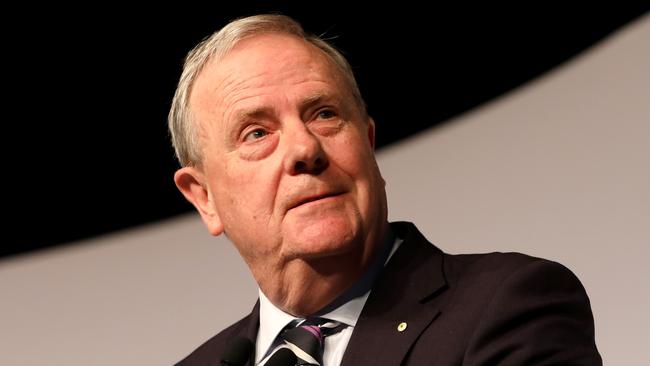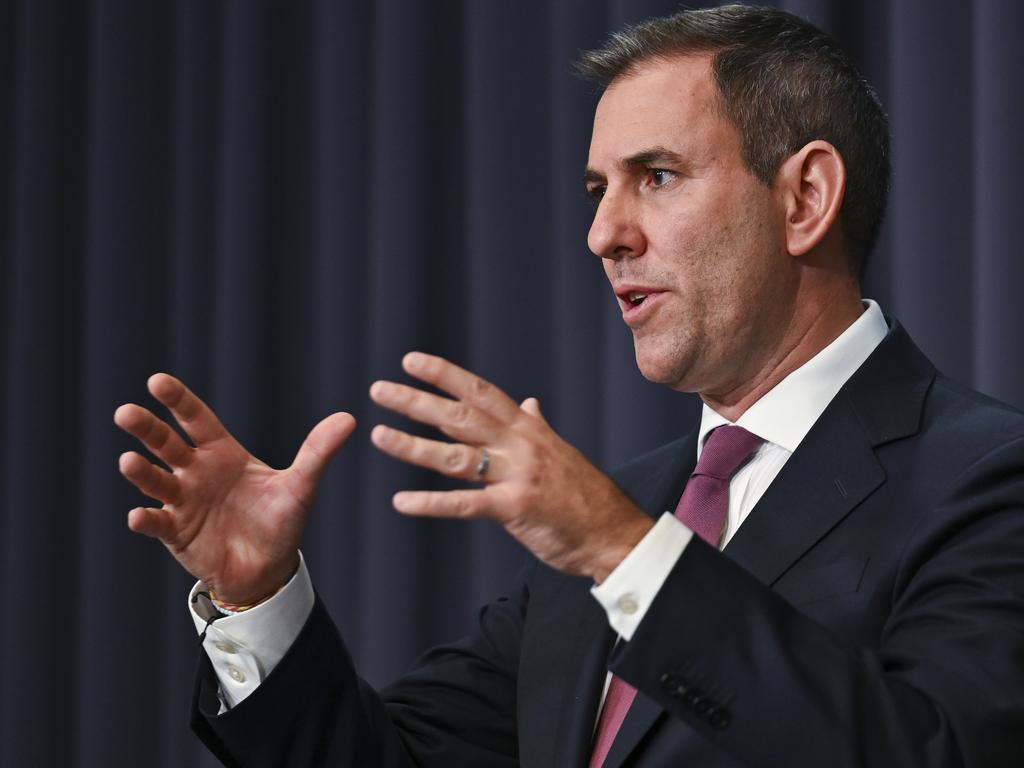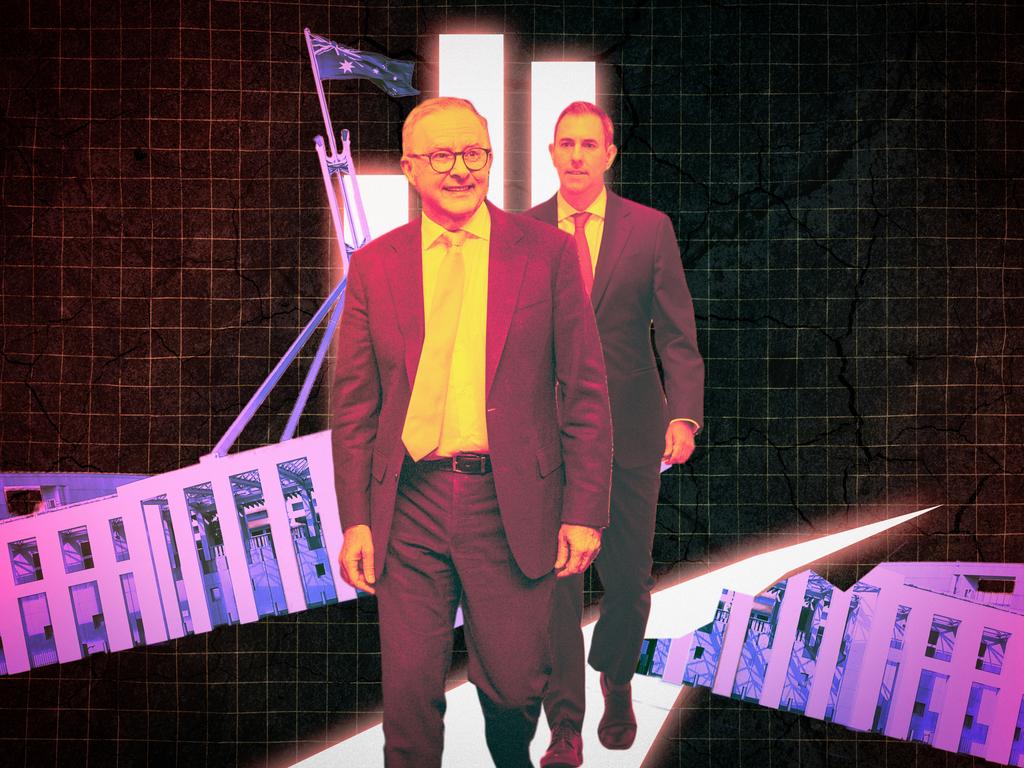Peter Costello warns Australia’s chance to lead the world economically is disappearing
Australia’s opportunity to remain a global economic leader is slipping away, with the nation risking a return to ‘middle of the pack’ among developed countries, says former treasurer Peter Costello.

Australia’s opportunity to remain a global economic leader is slipping away, with the nation risking a return to “middle of the pack” among developed countries, former treasurer Peter Costello has declared in a broadside against the Albanese government.
After Jim Chalmers’ mid-year budget update forecast deficits for at least a decade and government spending holding at near-record levels, economists on Friday warned public spending was leading to uncertainty for the Reserve Bank and economic reforms established in the 1980s and 90s were backsliding under Labor.
Anthony Albanese, who will use the Christmas break to chalk up new policies to win back waning voter support before an election to be held between March and May, said on Friday Labor had stopped Australia from descending into a downturn, the most recent increase in GDP being almost entirely supported by record government expenditure.
“We have kept the economy growing,” the Prime Minister said, contrasting Australia with New Zealand which on Thursday entered its deepest non-pandemic recession since 1991.
“We have at every single day and every meeting of my cabinet or of the (expenditure review committee) or of the other committees of the cabinet, been very focused on making sure that, in these difficult global economic times, we do what we can to provide support for people while setting up the foundations for future growth.”
The comments marked Mr Albanese’s first post-MYEFO defence of his government’s economic plan, two days after the Treasurer revealed a $58.3bn pre-election splurge, a decade of deficits and a four-year $22bn blowout in the budget bottom line. With a 5.7 per cent surge in real spending growth, the Prime Minister backed Dr Chalmers’ position that government spending had been needed to prevent a recession.
“We have kept the economy growing. We have created on our watch, more than a million jobs … We have real wages that are growing. We have inflation (that) has a two in front of it and is going down, as opposed to a six in front of it and was rising, that we inherited,” Mr Albanese said.
But Mr Costello told The Weekend Australian the nation’s envious economic position – which began under the Hawke government and continued under the Howard government with himself as treasurer – had been erased and that structural reform had become non-existent. “What we have lost is our exceptionalism – the idea that we can be exceptional,” Mr Costello said. “The idea that Australia can lead the world has disappeared. I feel it is the end of an era, when Australia was exceptional but does not see itself as exceptional any more.”
Mr Costello reflected on the economic reforms implemented during the Howard government, marked by the introduction of the goods and services tax, the establishment of Australia’s sovereign wealth fund and a restructuring of the industrial relations system.
“The era of Australian exceptionalism was seen in major structural reform, opening up markets – product markets, labour markets, financial markets – robust competition, the government getting out of business activity and exemplary fiscal policy,” he said.
Mr Costello said Australia as a consequence was viewed among other advanced economies as a pioneer of reform. “Australian exceptionalism became a phrase used in the (International Monetary Fund),” he said. “We were considered a model for other Western nations, This process began with (Bob) Hawke and (Paul) Keating but the fiscal high point – 10 budget surpluses and the retirement of all commonwealth debt – was considered to be Australian exceptionalism.”
While cuts to spending helped pay down government debt and bolster the bottom line during Mr Costello’s tenure as treasurer, so too did strong revenue receipts with the Howard government recording the highest average tax take in Australia’s history.
The tax-to-GDP ratio, which measures total tax revenue as a share of the economy, averaged 23.4 per cent during the Howard government, and climbed to a record high of 24.2 per cent in the 2005-06 financial year.
By contrast, the tax-to-GDP ratio this financial year is expected to ease to 23.4 per cent, according to Treasury projections released this week.
AMP chief economist Shane Oliver shared concerns over Australia’s economic “malaise”, arguing governments had regressed from reforms achieved under the Hawke, Keating and Howard governments. “We’ve actually seen a lot of backsliding,” Dr Oliver said, pointing to heavy re-regulation of the labour market, and claiming Labor’s host of off-budget investment vehicles covering manufacturing, housing and green energy were the “opposite of privatisation”.
Reform needed to be prioritised in other areas, Dr Oliver said, nominating the “complete mess” that was Australia’s tax system, the recent rise in government spending, and competition policy reform.
Whether Australians would demand another round of economic reforms was also debatable, Dr Oliver said.
Mr Albanese – when asked if stubborn inflationary pressures precluded the government from further cost-of-living relief in the lead-up to the election – pointed to the design of Labor’s previous policies.
“Energy bill relief has helped with cost of living and helped to lower inflation,” he said.
Luci Ellis, a former RBA assistant governor turned chief economist at Westpac, expected strength in government spending still to be “powering ahead”, and adding to uncertainty for the central bank. “The expansion in public services could continue for longer which is consistent with recent announcements, including increased funding for childcare and what may be a slow turn for NDIS spending and public investment,” Dr Ellis said.







To join the conversation, please log in. Don't have an account? Register
Join the conversation, you are commenting as Logout